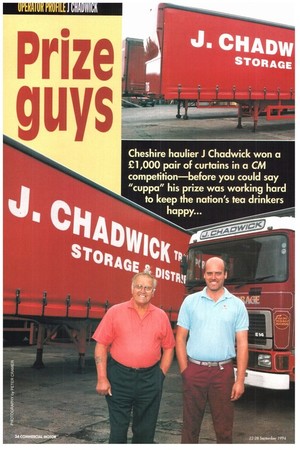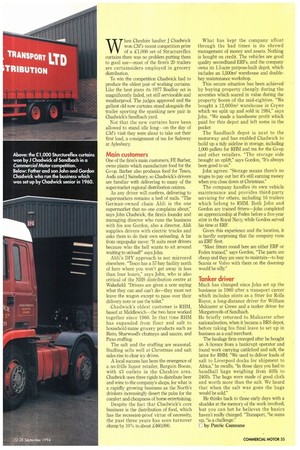Prize guys
Page 36

Page 37

If you've noticed an error in this article please click here to report it so we can fix it.
Cheshire haulier J Chadwick won a
£1,000 pair of curtains in a CM
competition—before you could say "cuppa" his prize was working hard to keep the nation's tea drinkers happy...
When Cheshire haulier J Chadwick won CM'S recent competition prize of a £1,000 set of Structureflex curtains there was no problem putting them to good use—most of the firm's 20 trailers are curtainsiders employed in grocery distribution.
To win the competition Chadwick had to produce the oldest pair of working curtains. Like the best jeans its 1977 Boalloy set is magnificently faded, yet still serviceable and weatherproof. The judges approved and the gallant old now curtains stand alongside the trailer sporting the spanking new pair in Chadwick's Sandbach yard.
Not that the new curtains have been allowed to stand idle long—on the day of CM's visit they were about to take out their first load, a consignment of tea for Safeway at Aylesbury.
Main customers
One of the firm's main customers, FE Barber, owns plants which manufacture food for the Co-op. Barber also produces food for Tesco, Asda and J Sainsbury, so Chadwick's drivers are familiar with delivering to many of the supermarket regional distribution centres, As any driver will confirm, delivering to supermarkets remains a bed of nails. "The German-owned chain Aldi is the one supermarket that no one complains about," says John Chadwick, the firm's founder and managing director who runs the business with his son Gordon, also a director. Aldi supplies drivers with electric trucks and asks them to do their own unloading. A far from unpopular move: "It suits most drivers because who the hell wants to sit around waiting to unload?" says John.
Aldi's DIY approach is not mirrored elsewhere, "Tesco has a 57-bay facility north of here where you won't get away in less than four hours," says John, who is also critical of the NHS distribution centre at Wakefield: "Drivers are given a note saying what they can and can't do—they must not leave the wagon except to pass over their delivery note or use the toilet" Chadwick's oldest customer is RHM, based at Middlewich—the two have worked together since 1960. In that time RHM has expanded from flour and salt to household-name grocery products such as Bisto, Sharwood's chutneys and sauces, and Paxo stuffing.
The salt and the stuffing are seasonal. Stuffing sells well at Christmas and salt sales rise to clear icy drives.
A local success has been the emergence of a no-frills liquor retailer, Bargain Booze, with 43 outlets in the Cheshire area. Chadwick uses three rigids to distribute beer and wine to the company's shops, for what is a rapidly growing business as the North's drinkers increasingly desert the pubs for the comfort and cheapness of home entertaining.
Despite the fact that Chadwick's core business is the distribution of food, which has the recession-proof virtue of necessity, the past three years has seen turnover slump by 10% to about £460,000.
What has kept the company afloat through the bad times is its shrewd management of money and assets. Nothing is bought on credit. The vehicles are good quality secondhand ERFs, and the company owns its 1.5-acre purpose-built depot, which includes an 5,500m2 warehouse and doublebay maintenance workshop.
This secure situation has been achieved by buying property cheaply during the seventies which soared in value during the property boom of the mid-eighties. "We bought a 12,000m2 warehouse in Crewe which we split up and sold in 1984," says John. "We made a handsome profit which paid for this depot and left some in the pocket The Sandbach depot is next to the motorway and has enabled Chadwick to build up a tidy sideline in storage, including 1,000 pallets for RHM and tea for the Co-op and other retailers. "The storage side brought an uplift," says Gordon, "It's always been good to us."
John agrees: "Storage means there's no wages to pay out but it's still earning money when you close down at Christmas."
The company handles its own vehicle maintenance and provides third-party servicing for others, including 16 trailers which belong to RHM. Both John and Gordon are trained fitters—John completed an apprenticeship at Foden before a five-year stint in the Royal Navy, while Gordon served his time at ERE Given this experience and the location, it is hardly surprising that the company runs an ERF fleet.
"Most fitters round here are either ERF or Foden trained," says Gordon, "The parts are cheap and they are easy to maintain—to buy Scania or Volvo with them on the doorstep would be silly."
Tanker driver
Much has changed since John set up the business in 1960 after a transport career which includes stints as a fitter for Rolls Royce, a long-distance driver for William Mulcaster at Crewe and a tanker driver for Murgatroyds of Sandbach.
He briefly returned to Mulcaster after nationalisation, when it became a BRS depot, before taking his final leave to set up in business as a coal merchant.
The haulage firm emerged after he bought an A-licence from a bankrupt operator and found work carrying cattlefeed and salt, the latter for RHM. "We used to deliver loads of salt to Liverpool docks for shipment to Africa," he recalls, "In those days you had to handball bags weighing from 401b to 2401b. The bags were made of good cloth and worth more than the salt. We heard that when the salt was gone the bags would be sold."
He thinks back to those early days with a shudder at the memory of the work involved, but you can bet he believes the basics haven't really changed. "Transport, "he sums up, "is a challenge."
E by Patric Curinatie
























































































